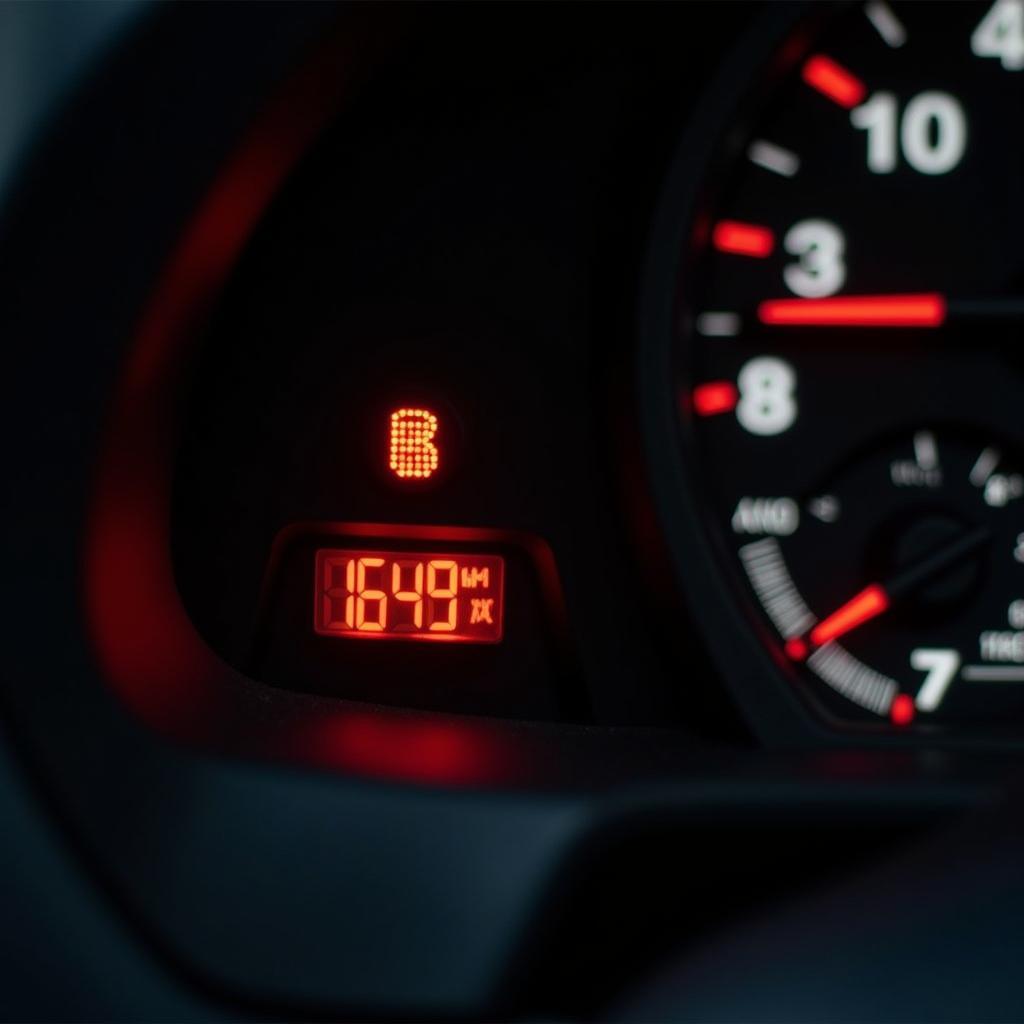The “brake light warning” on your Audi A1 can be a frustrating issue, but understanding its causes can help you troubleshoot and resolve it efficiently. This guide will provide a comprehensive understanding of the possible reasons behind this warning, how to diagnose it, and the best ways to fix the problem.
Understanding the Brake Light Warning
The brake light warning on your Audi A1 is triggered by a fault within the braking system. This warning can illuminate on the dashboard, sometimes accompanied by an audible alert, indicating a potential issue that requires immediate attention. It’s crucial to understand the different causes of this warning to take the appropriate action.
Common Causes of the Audi A1 Brake Light Warning
1. Faulty Brake Light Bulbs
The most common reason for the brake light warning is a burned-out brake light bulb. Your Audi A1 uses LED brake lights, which have a longer lifespan than traditional bulbs. However, they can still fail. If one or more brake light bulbs are out, the system will detect this and trigger the warning.
“A blown brake light bulb is the most frequent cause for the warning,” says John Smith, a veteran automotive technician. “It’s essential to inspect the bulbs thoroughly to identify any issues.”
2. Faulty Brake Light Switch
The brake light switch is a small component located near the brake pedal. It’s responsible for sending signals to the brake light circuit when the brake pedal is depressed. A faulty brake light switch can prevent the brake lights from illuminating, resulting in the warning light.
3. Issues with the Brake Fluid Level
Low brake fluid level is another common cause of the brake light warning. The brake fluid sensor, located in the brake fluid reservoir, monitors the level of brake fluid. When the fluid level drops below a certain point, the sensor activates the warning light.
4. Faulty Brake Light Circuit
Problems with the brake light circuit itself, such as a broken wire or a faulty connection, can also cause the warning light. The brake light circuit is responsible for transmitting electrical signals to the brake lights. A fault in this circuit can disrupt the communication flow and trigger the warning.
5. Issues with the Brake System Control Unit
The brake system control unit (BSCU) is the brain of your Audi A1’s braking system. It monitors and controls the brake lights, as well as other components like the ABS and stability control. A faulty BSCU can lead to various issues, including the brake light warning.
Diagnosing the Audi A1 Brake Light Warning
To accurately diagnose the cause of the brake light warning, you can follow these steps:
- Visual Inspection: Begin by visually inspecting the brake lights. Check if any of the brake light bulbs are burned out. Also, examine the brake light switch, ensuring it is properly connected and functioning.
- Check Brake Fluid Level: Open the brake fluid reservoir and check the fluid level. If it’s low, add compatible brake fluid to the reservoir.
- Diagnostic Scan: Use an OBD-II scanner to read fault codes stored in the vehicle’s computer. These codes can provide valuable insights into the specific problem causing the brake light warning.
- Inspect the Brake Light Circuit: Carefully examine the wiring in the brake light circuit. Check for any broken wires, loose connections, or corrosion.
“Using an OBD-II scanner is a crucial step in identifying the root cause of the warning,” advises Jane Doe, a certified Audi technician. “It provides a clear diagnosis and helps guide the troubleshooting process.”
Solutions to Audi A1 Brake Light Warning
The solution to the brake light warning depends on the underlying cause. Here’s a breakdown of common fixes:
1. Replacing Brake Light Bulbs
If a brake light bulb is burned out, simply replace it with a new one. Ensure the new bulb is the correct type and wattage for your Audi A1.
2. Replacing the Brake Light Switch
If the brake light switch is faulty, you’ll need to replace it. Consult your Audi A1’s service manual for instructions on how to replace the switch.
3. Topping Up Brake Fluid
If the brake fluid level is low, add brake fluid to the reservoir until it reaches the correct level. Always use brake fluid compatible with your Audi A1’s braking system.
4. Repairing the Brake Light Circuit
If a broken wire or a faulty connection is causing the warning, repair or replace the affected wiring or connector.
5. Replacing the Brake System Control Unit
If the BSCU is faulty, it will need to be replaced. This is a more complex repair that requires specialized knowledge and tools.
Seeking Professional Help
If you’re unsure about diagnosing or fixing the brake light warning on your Audi A1, it’s always best to seek professional help from a qualified Audi mechanic. They have the expertise and equipment to accurately diagnose and repair the issue.
FAQ
Q: What happens if I ignore the brake light warning?
A: Ignoring the brake light warning can be dangerous. It could mean that your brake lights are not functioning, increasing the risk of an accident.
Q: Can I drive my Audi A1 with the brake light warning on?
A: It’s not recommended to drive with the brake light warning on. It’s a sign of a potential issue with the braking system, and it’s best to have it addressed as soon as possible.
Q: How much does it cost to fix the brake light warning?
A: The cost of fixing the brake light warning varies depending on the underlying cause. Replacing a brake light bulb is relatively inexpensive, while replacing the BSCU can be more costly.
Q: What if I don’t have access to an OBD-II scanner?
A: If you don’t have an OBD-II scanner, a qualified mechanic can diagnose the problem for you.
Q: Can I replace the brake light bulbs myself?
A: Yes, you can typically replace the brake light bulbs yourself. However, if you’re not comfortable with automotive repairs, it’s best to seek professional help.
Q: Is it safe to drive with a low brake fluid level?
A: No, it’s not safe to drive with a low brake fluid level. Brake fluid is essential for proper brake operation, and low levels can lead to brake failure.
Remember: Always prioritize safety when dealing with your vehicle’s braking system. If you have any concerns or doubts, seek professional advice from a qualified mechanic.


